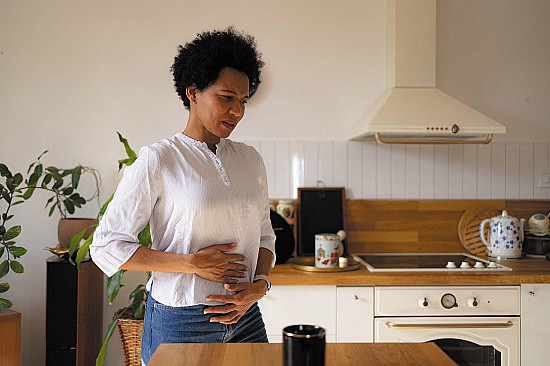What can cause blood in stool?
- Reviewed by Howard E. LeWine, MD, Chief Medical Editor, Harvard Health Publishing; Editorial Advisory Board Member, Harvard Health Publishing

Discovering blood in your stool can be alarming, but it doesn't always signal a serious medical condition. Regardless of the cause, it's crucial to seek medical advice if you notice blood in your stool, as early detection and treatment can lead to better outcomes if it is caused by something serious.
What does blood in stool look like?
The appearance of blood in stool can vary, and the color of the blood often gives clues about the source of bleeding.
- Bright red blood usually suggests bleeding from the lower gastrointestinal tract, such as the rectum or anus, and may be visible on toilet paper, in the toilet bowl, or on the surface of the stool. Small amounts of blood in the toilet bowl or on toilet paper are often linked to conditions like hemorrhoids or anal fissures. However, certain foods such as beets, tomatoes, or foods with red food coloring can also cause stools to appear reddish. If you notice larger amounts of bright red blood, you should immediately let your healthcare provider know.
- Dark or tarry stools may indicate bleeding from a higher part of the digestive tract such as the stomach or small intestine. As the blood moves through the gastrointestinal system, it may be partially digested, resulting in a black, sticky appearance. However, certain foods, including blood sausage, blueberries, and black licorice, can also lead to dark stools. So can iron supplements, bismuth subsalicylate (found in Pepto-Bismol), and activated charcoal.
What can cause blood in stool?
There are many potential causes of rectal bleeding or blood in stool, ranging from minor issues like foods recently eaten, hemorrhoids, or anal fissures to more significant concerns such as gastrointestinal bleeding, infections, or inflammatory bowel diseases.
Hemorrhoids
Hemorrhoids are swollen blood vessels that can develop either externally (around the anus) or internally (in the lower rectum). They are the most common cause of rectal bleeding in middle-aged and older adults. Factors such as chronic constipation, straining during bowel movements, pregnancy, and prolonged sitting on the toilet can cause hemorrhoids. Symptoms of hemorrhoids can include rectal pain, itching, bleeding, and, in some cases, prolapse, where the hemorrhoids protrude through the anal canal.
Anal fissures
Anal fissures are small tears in the skin of the anal canal, often caused by constipation and straining to pass hard stools. Fissures can also occur due to diarrhea, vaginal childbirth, or infections. Common symptoms of anal fissures include sharp pain during bowel movements, itching around the anus, muscle spasms in the anal area, a lump or skin tag near the anus, and bright red blood in the stool, which may be seen on toilet paper after a bowel movement.
Diverticulosis
Diverticulosis occurs when weak spots in the inner wall of the colon cause small pouches to form. Over time, the blood vessels within these pouches can become fragile and prone to rupture, leading to bleeding. While diverticulosis is quite common, many people are unaware that they have it.
Colon polyps
Colon polyps are growths that occur in the large intestine (also called the colon). They are quite common — between 15% and 40% of adults may have polyps. Most polyps are benign, but some have the potential to develop into cancer over time. Removing polyps is an important step in preventing colorectal cancer.
Most people with colon polyps don't experience symptoms. However, you should see your doctor immediately for advice if you develop rectal bleeding, as it may be a sign of polyps.
Gastrointestinal infections
Certain gastrointestinal infections can cause inflammation and irritation anywhere in the digestive tract. Helicobacter pylori is a bacterial overgrowth in the stomach that can lead to bleeding ulcers and black stools. Other bacteria and parasites that infect the intestines can cause bright red blood in the stool, often associated with abdominal cramps and diarrhea.
Inflammatory bowel disease (IBD)
Inflammatory bowel disease (IBD) — such as ulcerative colitis or Crohn's disease — results from an abnormal reaction by the body's immune system. This can expose your entire gastrointestinal system to inflammation and lead to a series of digestive problems including abdominal pain, cramping, diarrhea, more urgent bowel movements, and bloody stools.
Colon cancer
Colorectal cancer is a type of cancer that starts in the tissues of the colon or rectum. When cancer originates in the colon, it is referred to as colon cancer. While colorectal cancer may not always cause noticeable symptoms, common signs can include changes in bowel habits, blood in the stool (either bright red or dark), frequent gas pains, bloating, feelings of fullness or cramping, weight loss, and fatigue.
Screening for colon cancer saves lives. Colonoscopy is considered the gold standard screening test because polyps identified during the procedure can be removed before they become cancerous. Colonoscopy can also detect early cancers that can be cured with surgery. Alternative tests include stool tests for DNA and occult blood, with or without sigmoidoscopy.
When should you see a doctor for blood in stool?
Anyone experiencing persistent or recurring blood in the stool, even in small amounts, should schedule an appointment with their doctor. The stool should be assessed by a health care provider to identify the underlying cause.
About the Author

Jenette Restivo, Health Writer; Assistant Director for Digital Content Creation and Engagement, Harvard Health Publishing
About the Reviewer

Howard E. LeWine, MD, Chief Medical Editor, Harvard Health Publishing; Editorial Advisory Board Member, Harvard Health Publishing
Disclaimer:
As a service to our readers, Harvard Health Publishing provides access to our library of archived content. Please note the date of last review or update on all articles.
No content on this site, regardless of date, should ever be used as a substitute for direct medical advice from your doctor or other qualified clinician.















